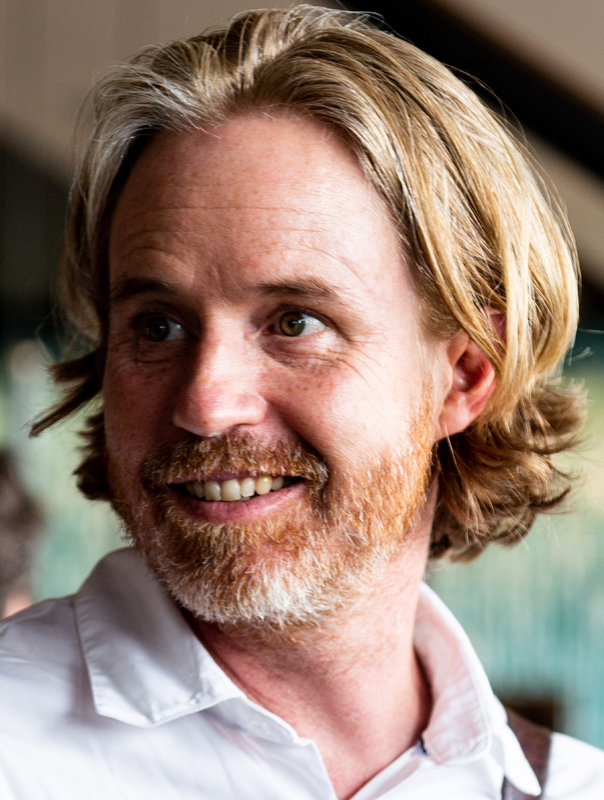|
(English Translation Below)
Dag 55: Nzerekore na Faranah Ons word wakker met 'n wolk-kombers wat die aarde koel hou, maar dalk reën kan bring. Ons pak, eet eier en suurdeegbrood. Koffie. Net voor ons ry vertel 'n Engelsman ons van 'n slegte stuk pad wat ons voorlê vandag. Klippe en dik modder en vragmotors. Ons wil 450km ry vandag. Dit gaan 'n lang dag wees. Nzerekore se oggendverkeer is chaos - soos elke groterige dorp van Angola to nou toe. Maar mens raak gewoond daaraan: honderderde toetende motorfietsies met twee of drie of vier passasiers, 'n bok of 'n vark of 'n paar hoenders of 'n sink geut of sommer 'n ander motorfietsie dwars agterop. Al vleggene deur die gate en plasse modder en vragmotors. Skielik een wat reg van 'n systraat af injaag sonder om te kyk. Mis vir De Witt met 'n haarbreedte. My oog vang 'n ou man wat in die straat inhardloop, buk, iets optel. Lyk soos 'n selfoon. Hy kyk vlugtig of dit werk en skoert dan weer blitsig uit die malemoes. Dis asof die prentjie perfek vir my ge-orkestreer was, want skielik tref dit my dat ek my selfoon in die hotel vergeet het. Ons stop. Ek deursoek my sakke. Dan draai ons om, terug die verkeer in, hotel toe. Kry die foon nog net waar ek hom gelos het. Die wolke bly rustig oor ons hang. En die pad, waarteen mense ons al in Nigerië begin waarsku het, is geteer. Hier en daar 'n gat, nou en dan 'n spoedwal, maar meestal al kronkelende deur die woud wat haar vingers bo ons toevou. Selfs die polisie-blokkades speel saam, glimlag telkens vir ons en laat ons deur sonder om ons te stop. Later reën dit om ons af te koel, en voor ons koudkry hou dit op en word ons weer winddroog. Skielik die slegte stuk. 'n Teerpad wat 'n krummelpad geword het. Maar die reen was gelukkig nie hier nie, so dis net 'n modderplas hier en daar wat mens maklik misry, en baie gate wat jy nie kan mis nie. So dit vorder stadig, maar ná 20km word dit weer teer. Die laaste ent Faranah toe voel lank. Ons is honger, ons lywe is seer en ons het alweer te min water gedrink. De Witt sê oor die interkom in ons valhelms dat hy net nie weer vanaand vis wil eet nie. As daar 'n keuse is wil hy hoender eet. Ek stem saam. Visgrate is te moeilik as mens regtig honger is. Die laaste stuk grondpad tot by Hotel Niger, 'n afferige plek, is mooi. Mens kan ry! Skielik 'n spoedwal. Onsigbaar in die skemer en stof. De Witt vlieg in 'n stofwolk daaroor. Toe ek. Waaiende mense roep langs die pad. Het iets afgeval? Ek voel agter my. Als is nog daar. 'n Uur later, toe ons afsaal, sien De Witt sy sak met paspoort en geld en dokumente is weg. Hy spring op sy fiets en ry terug om te soek. Toe hy nog ver is, waai iemand al vir hom. Hy't gesit en wag - geweet die vreemdeling sal terugkom vir sy sak. Afrika sorg vir ons. Toe dit donker is en tyd vir ete, gaan De Witt solank die eetsaal binne terwyl ek buite klaarmaak op die telefoon met my seun. Ná 'n rukkie volg ek hom. Die kombuis het slegs nog een bord vis en een bord hoender oorgehad en tafel toe gebring terwyl ek buite was. De Witt het vir my die hoender gelos. Day 55: Nzerekore to Faranah We wake up with a blanket of clouds that keeps the earth cool, promising rain. We pack, eat eggs and sourdough bread. Coffee. Just before we leave, an Englishman tells us about a bad stretch of road ahead today. Rocks and thick mud and cargo trucks. We want to cover 450km today. It's going to be a long day. Nzerekore's morning traffic is chaos - like every larger village from Angola until now. But you get used to it: hundreds of honking motorcycles with two or three or four passengers, a goat or a pig or a few chickens or a zinc gutter or simply another motorcycle loaded sideways on the carrier. All weaving through the potholes and mud puddles and cargo trucks. Suddenly one zips in from a side street without looking. Misses De Witt by a hair's breadth. My eye catches an old man running in the street, bending down, picking up something. Looks like a cellphone. He briefly checks if it works and swiftly darts out of the maelstrom. It's as if the scene was perfectly orchestrated for me, because suddenly it hits me: I forgot my cell phone at the hotel! We stop. I search through my bags. Then we turn around, back into the traffic, heading to the hotel. Find the phone just where I left it. The clouds hang calmly over us. And the road, which people warned us about in Nigeria already, is paved. A hole here and there, now and then a speed bump, but mostly winding through the forest that folds its fingers above us. Even the police blockades play along, smiling every time and letting us pass without stopping us. Later it rains to cool us down, and just before we get cold, it stops, and we are wind-dried again. Suddenly the bad stretch. A tar road that deteriorated into a gravel road. Fortunately, today's rain wasn't here yet, so it's just a mud puddle here and there that you can easily dodge, and many potholes that you can't miss. So progress is slow, but after 20km, it becomes tar again. The last stretch to Faranah feels long. We are hungry, our bodies are sore, and we have once again not drunk enough water. De Witt says over the intercom in our helmets that he just doesn't want to eat fish tonight. If there's a choice, he wants to eat chicken. I agree. Fish bones are too challenging when you're really hungry. The last stretch of dirt road to Hotel Niger, a shabby place, is beautiful. You can ride it! Suddenly a speed bump. Invisible in the dusk and dust. De Witt flies over it in a red cloud of dust. Then I do too. People along the road are yelling something. Has something fallen off? I feel behind me. Everything is still there. An hour later, when we dismount, De Witt realises his bag with passport, money, and documents is gone. He jumps on his bike and rides back to search. When he is still far away, someone waves for him. He sat and waited - knowing the stranger would come back for his bag. Africa is taking care of us. When it's dark and time for dinner, De Witt goes into the dining room while I finish up outside on the phone with my son. After a while, I follow him. The kitchen only had one plate of fish and one plate of chicken left and brought it to the table while I was outside. De Witt left the chicken for me.
0 Comments
Leave a Reply. |
AuthorThis blog was written by Dr. Jean Cooper. For my work as organisational psychologist, adventurer and writer, go to www.jeanhenrycooper.com |



